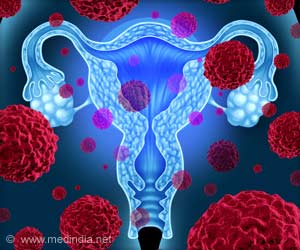, according to the American Cancer Society.
HGSOC is lethal in part because it is often resistant to chemotherapy. Immunotherapy, a therapeutic approach that uses a person’s immune system to fight disease, has been promising in many cancers, but approaches to use immunotherapy have not yet shown success in HGSOC.
One approach to immunotherapy targets proteins called checkpoint receptors that act as brakes on immune system activation. Inhibitors of checkpoint receptors release this brake, allowing the immune system to attack cancer cells.
“Cancers can develop without obvious symptoms. The most common sign of ovarian cancer is abdominal swelling when the disease is advanced, which is when most women are diagnosed“, said Schlaepfer, Ph.D., professor in the Department of Obstetrics, Gynecology and Reproductive Sciences at UC San Diego School of Medicine.
Researchers found that activation of a key signaling protein within tumors regulated the expression of a protein called CD155 that binds to the checkpoint receptor called TIGIT on immune cells.
In effect, the tumor is building a safe environment for the cancer cells to grow and evade immune detection in part by maintaining high levels of CD155 as a shield against immune attack.
In a preclinical model of aggressive ovarian cancer, researchers found that an oral anti-FAK drug reduced CD155 and other checkpoint proteins. When used together with immunotherapy blocking TIGIT, an elevated immune response was observed against the ovarian cancer cells. This, in turn, resulted in smaller tumors and longer survival.
Several companies are testing inhibitors to FAK and others have inhibitory antibodies to the TIGIT checkpoint receptor in clinical trials. In HGSOC tumors, where high levels of CD155 and active FAK are common, this study’s results provide compelling support for targeting FAK and TIGIT as part of a new immune-boosting therapeutic strategy.
Source: Medindia



